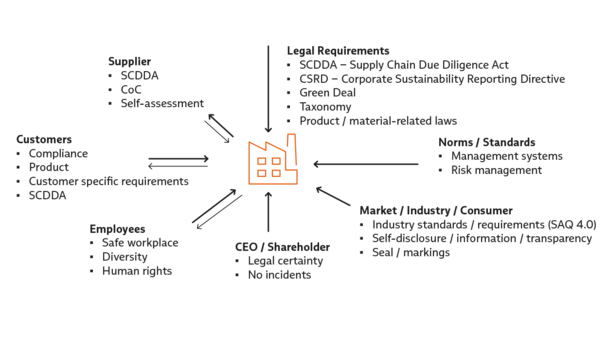Quality Management & Sustainability
Sustainability – an increasingly relevant topic that must also be taken into account in modern quality management.
The expectations of interested parties include sustainability.
In addition to normative requirements, this also includes legal requirements such as the Supply Chain Act, reporting obligations and also customer requirements.
Quality management has an important function here.
When it comes to meeting sustainability expectations, interfaces with a company's QM stand out.
Our QM software helps you meet expectations.
Use our BabtecQ software, for example, for clear dashboards, your document management or your central task and action management.

Sustainable Quality Management
In which dimensions sustainability can be implemented

When it comes to implementing sustainability, it must always be thought of in three dimensions: social, ecological and economic. It is important to consider the interplay of the dimensions and to bring them into harmony. Each dimension contains aspects that we can influence with our quality processes. Some examples are the following:
- In social terms, it is relevant to comply with human rights as well as labor and social standards, but also to shape customer and supplier relationships fairly.
- Ecological aspects relate to operational environmental protection, climate protection and the careful use of resources and energy.
- With regard to the economy, the existence of the company, work and the income of all employees must be secured. In addition, it is a matter of managing risks and opportunities, designing as well as developing processes efficiently and continuously.
Expectations of Interested Parties Are Individual

The three dimensions give you an initial idea of the areas in which you can promote sustainability in your corporate activities. A look at the interested parties or stakeholders of a company shows which specific fields you can address.
These need to be systematically recorded, incorporated into corporate processes, documented and – most importantly – put into practice. Start now and define what the interested parties expect from your company in terms of sustainability!
Promoting Sustainability – with BabtecQ
How you dedicate yourself to sustainability with our software
To meet the different expectations of all interested parties, it is worthwhile to use different modules of our QM software. In this way, you not only map your quality processes, but also fulfill requirements on the topic of sustainability. To do this, you simply add the topics relevant to you regarding sustainability to the processes mapped in the software.
Documents such as process and work instructions, quality guidelines, standards, flowcharts, checklists, forms, organizational structures or job descriptions usually come along with requirements from interested parties. With BabtecQ, you create, manage and control your documents systematically and permanently minimize sources of error in your QM documentation.
Key figures are essential for controlling a company – and also provide information about performance and the development of risks and opportunities. The Quality Cockpit in BabtecQ provides you with a dashboard that gives you an overview of all key figures at any time and from anywhere – including those that relate to your selected sustainability goals.
Central tasks and actions management is, in a sense, the linchpin for generating sustainable quality. At this point, specific tasks and actions can be derived from all the potential for improvement that you define in your corporate processes with regard to sustainability.
Audits are the tool of choice for checking the effectiveness of a management system – whether it is the company's own or that of your supplier. They examine whether the company's internal processes and guidelines comply with the standards. Simply add sustainability requirements to your audit management by creating your own audit type or using existing questionnaires.
Complaints are extremely helpful for the manufacture of innovative products and long-term customer loyalty if their causes are consistently analyzed and tracked. They reveal the need for action and enable continuous improvement of products and processes on the part of the supplier. But also in the case of deviations or events in the context of sustainability, a software-supported complaint management system serves as a reporting system to record and consider incidents.
With the use of software-supported training and qualification management, you ensure that your employees have the competencies required for their jobs – or expand them as needed. In this way, you continuously develop your employees, secure their jobs and efficiently integrate them into the processes.



